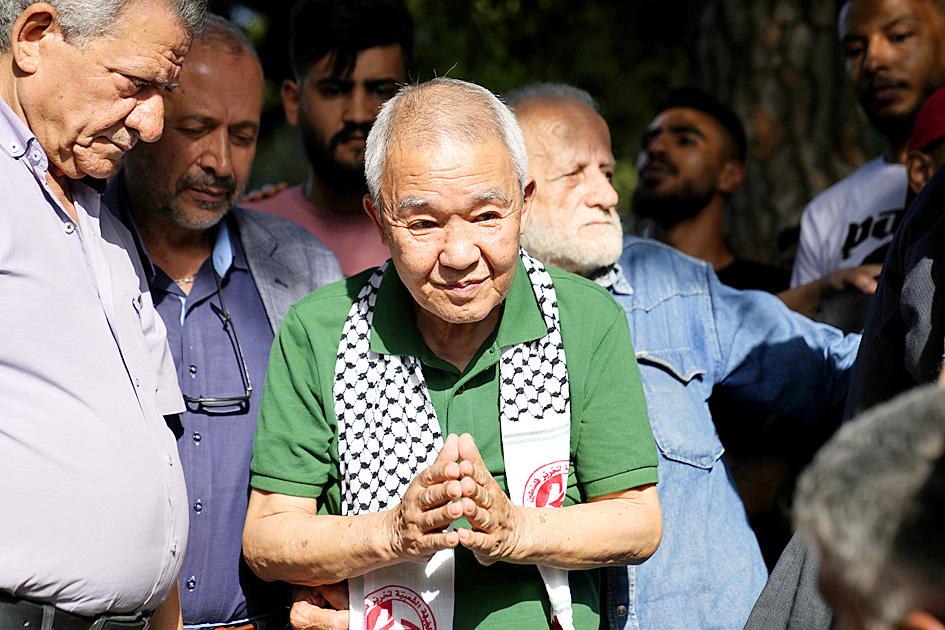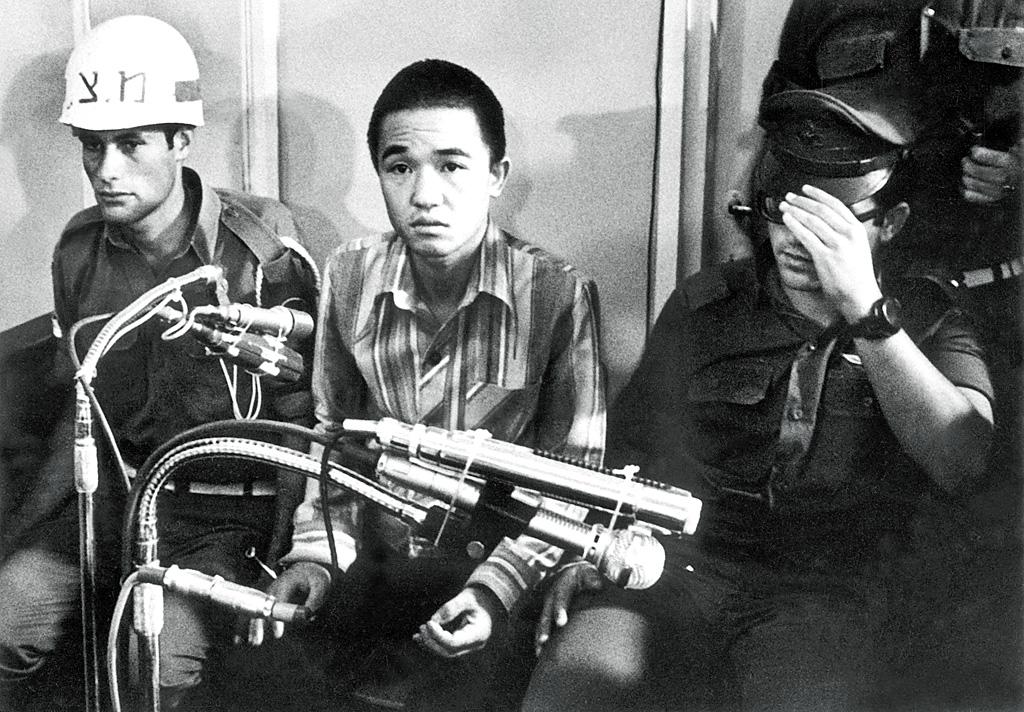Kozo Okamoto’s life should have ended in 1972 when he took part in a suicide attack on Israel’s Lod Airport that killed 26 people.
Yet half a century and two stints in prison later, he is still alive, leading an uneventful existence as Lebanon’s first and only political refugee.
Now a frail, gray-haired man, Kozo Okamoto is still wanted in his native Japan, but remains something of a folk hero in Lebanon’s Palestinian refugee camps.

Photo: AP
When he boarded the Air France flight from Rome on May 30, 1972, the name he was given by the Japanese Red Army (JRA) on his fake passport was Daisuke Namba, a man who tried to assassinate Crown Prince Hirohito in 1923.
However, Ahmad was the nom de guerre he went by in the Popular Front for the Liberation of Palestine (PFLP), the leftist organization that trained him and planned the attack for the JRA.
Prior PFLP hijackings had led to increased passenger screening by airlines, but inspection of check-in luggage was still rare.

Photo: AFP
Kozo Okamoto and his two accomplices passed through immigration untroubled at what is now the high-security Ben Gurion Airport near Tel Aviv.
They picked up their baggage from the carousel, whipped out assault rifles and grenades to sow carnage around them.
Among the 26 killed were one Canadian and eight Israelis.
All 17 others were Christian pilgrims from Puerto Rico. To this day, a remembrance ceremony is held every May 30 in San Juan.
The massacre was planned as a suicide attack and all three Japanese militants had intended to mutilate their faces with their grenades to make identification more difficult.
Two of them died, but Okamoto was wounded and captured.
By the time he was released as part of a massive prisoner exchange in May 1985, Okamoto was not dead, but he seemed barely alive.
“When he was released, he looked like a corpse,” said Abu Yusef, a PFLP official in Beirut who provides for Okamoto’s needs, from accommodation to food and health care.
Okamoto had spent much of his Israeli jail time in solitary, forced to eat from the ground like a dog, with his hands cuffed behind his back, according to the PFLP.
Long after his release, Abu Yusef told AFP in an interview, he would still lean over the table and finish his plate by licking it clean.
After years in JRA camps in Lebanon’s Bekaa Valley, Okamoto was arrested in 1997 on forgery charges.
Under pressure from Tokyo, four other JRA members were extradited in 2000, but Okamoto was released and granted asylum after weeks of demonstrations by pro-Palestinian groups.
He has since lived in the care of the PFLP, whose influence has dwindled since its terrorist operations made headlines decades ago, but still treats Okamoto with the respect owed to elders.
His minders used to give him little bundles of eight cigarettes three times a day but the 74-year-old quit smoking recently.
He eats his meals at set times and spends hours watching Tom and Jerry or other cartoons on television.
Okamoto lives in semi-hiding, with limited knowledge of the outside world.

Drug lord Jose Adolfo Macias Villamar, alias “Fito,” was Ecuador’s most-wanted fugitive before his arrest on Wednesday, more than a year after he escaped prison from where he commanded the country’s leading criminal gang. The former taxi driver turned crime boss became the prime target of law enforcement early last year after escaping from a prison in the southwestern port of Guayaquil. Ecuadoran President Daniel Noboa’s government released “wanted” posters with images of his face and offered US$1 million for information leading to his capture. In a country plagued by crime, members of Fito’s gang, Los Choneros, have responded with violence, using car

The team behind the long-awaited Vera Rubin Observatory in Chile yesterday published their first images, revealing breathtaking views of star-forming regions as well as distant galaxies. More than two decades in the making, the giant US-funded telescope sits perched at the summit of Cerro Pachon in central Chile, where dark skies and dry air provide ideal conditions for observing the cosmos. One of the debut images is a composite of 678 exposures taken over just seven hours, capturing the Trifid Nebula and the Lagoon Nebula — both several thousand light-years from Earth — glowing in vivid pinks against orange-red backdrops. The new image

CYBERCRIME, TRAFFICKING: A ‘pattern of state failures’ allowed the billion-dollar industry to flourish, including failures to investigate human rights abuses, it said Human rights group Amnesty International yesterday accused Cambodia’s government of “deliberately ignoring” abuses by cybercrime gangs that have trafficked people from across the world, including children, into slavery at brutal scam compounds. The London-based group said in a report that it had identified 53 scam centers and dozens more suspected sites across the country, including in the Southeast Asian nation’s capital, Phnom Penh. The prison-like compounds were ringed by high fences with razor wire, guarded by armed men and staffed by trafficking victims forced to defraud people across the globe, with those inside subjected to punishments including shocks from electric batons, confinement

Canada and the EU on Monday signed a defense and security pact as the transatlantic partners seek to better confront Russia, with worries over Washington’s reliability under US President Donald Trump. The deal was announced after a summit in Brussels between Canadian Prime Minister Mark Carney and European Commission President Ursula von der Leyen and European Council President Antonio Costa. “While NATO remains the cornerstone of our collective defense, this partnership will allow us to strengthen our preparedness ... to invest more and to invest smarter,” Costa told a news conference. “It opens new opportunities for companies on both sides of the